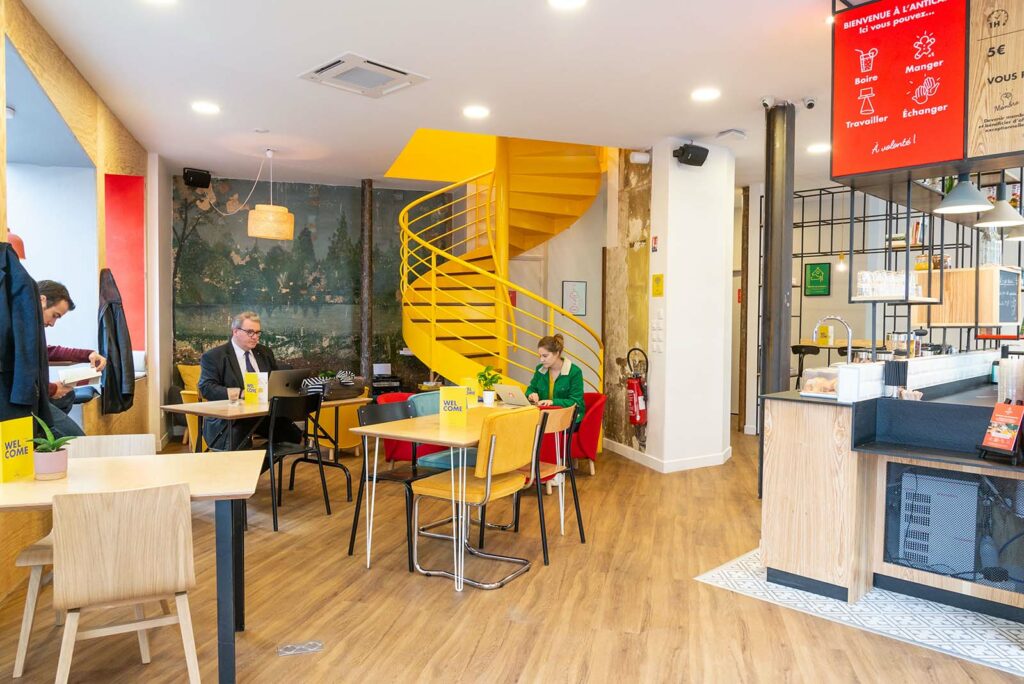For more than a year, the global pandemic has dominated our lives, totally disrupting the world of work and redrawing the boundaries. Among the many changes to emerge has been the need for employees and companies alike to rethink the way they do things, notably by working from home.
As we slowly but surely move towards a post-Covid recovery, how can the office, co-working and working from home come together? Leonid Goncharov, the founder and CEO of Anticafé, a network of coworking café spaces, provides some answers.
When Leonid Goncharov launched Anticafé in 2013, he thought he was responding to a natural evolution in the use of workspaces. He never imagined what would follow seven years later and the impact this would have on the way we work, now and in the future. While his network of 10 locations in France has only been open for four months since March 2020, it has affected neither his inventiveness nor his sense of optimism.
The office, the home and third places will end up coexisting
“When I founded Anticafé, there were 18 co-working spaces in France. Today, there are more than 3,000 of them. The concept brings together three different worlds – the café, the co-working space and the home – and takes a little from each of them, which is its strength. It has all the accessibility of a café, in that it’s open to anyone, any time of day, and with no need for a contract (as you pay by the hour, or by the day). It has all the services, facilities, equipment, ergonomics and technology of a coworking. And it also has an atmosphere that’s warm and welcoming, that encourages people to talk to one another, just like at home or at a friend’s place. For me, it’s totally adapted to the needs and expectations of the future world of work, where the choice of location will depend on the tasks to be done, people’s routines, etc.”
It means that the office, the home and third places – and co-working spaces in particular – will end up coexisting. This will create a range of possible options, depending on whether someone needs to really concentrate, carry out ‘deep work’, make a confidential call, organise a meeting, have a discussion with colleagues, collaborate or reply to emails…
A survey carried out by Essec between April and September 2020 among 2,600 people confirmed these ideas. “The survey highlighted the fact that in the near future, we will be spending one day a month in third places, which matches our own predictions and is close to what we were already experiencing. While the post-pandemic recovery will not be easy, I’m convinced that the need for our kind of space will only increase. Places like ours will play an ever-greater role. Based on the results of various surveys, I’ve reached the conclusion that employee demand for third-places will increase 100-fold in the near future. So, we remain fairly optimistic.”
While the post-pandemic recovery will not be easy, I’m convinced that the need for our kind of space will only increase.
That said, Leonid Goncharov – whose Anticafés were forced to close because of government restrictions to combat the pandemic – doesn’t see the relaxation of government health measures as being THE solution to opening back up his business. Instead, the long months of lockdown have enabled him to think about a variety of complementary offerings, such as Antistudio.
“For me, the main limitations of remote working are often technical ones (poor internet connections, lack of access to office-based resources, etc.), along with the inability to shut yourself away,” he adds. “With the proliferation of video calls, hybrid meetings that are a mixture of online and in-person presence, distance learning, and the creation of online content like webinars or the incredible growth in podcasts, there seemed to be a desperate lack of recording studios, which are also often very expensive and reserved for professionals. With Antistudio, we have a flexible offering for creating audio and video content that’s available to anyone.”
“Leaving the office and changing your environment gives you fresh energy and stimulates creativity”
At the same time, the entrepreneur has also developed The Pass, a system of prepaid cards for companies that allows their employees to access Anticafés whenever they want, without having to pay from their own pockets. Launched before Covid-19, The Pass was already used by a few dozen companies, and Leonid Goncharov is confident about its future prospects.
The possibility of working where you want to has become an argument in some companies’ favor when it comes to hiring.
“Leaving the office and changing your environment gives you fresh energy and stimulates creativity. The pandemic has opened up new horizons and changed the way that employers and employees think about things. For the most part, the latter have appreciated this flexibility, and managers have generally been reassured about their initial fears over a loss of productivity and personal contact. They have also realised that savings can be made in office space – and I would add, in passing, that even before Covid-19, the occupation rate of offices in France was 60%. And on top of all that, the possibility of working where you want to has become an argument in some companies’ favor when it comes to hiring.”
Clearly, the future of the workplace is undergoing a major transformation. “Once the pandemic is over, tertiary sector employees are expected to spend one day a month, on average, in third places, two days a week working from home and three days a week in the office,” concludes Leonid Goncharov.
A new way of organising people’s time at work seems to be emerging, one that is more suited to finding a balance that would sacrifice neither productivity nor the well-being of employees…
Leonid Goncharov is an alumnus of ESCP’s Master in Management and Option-E programme.
